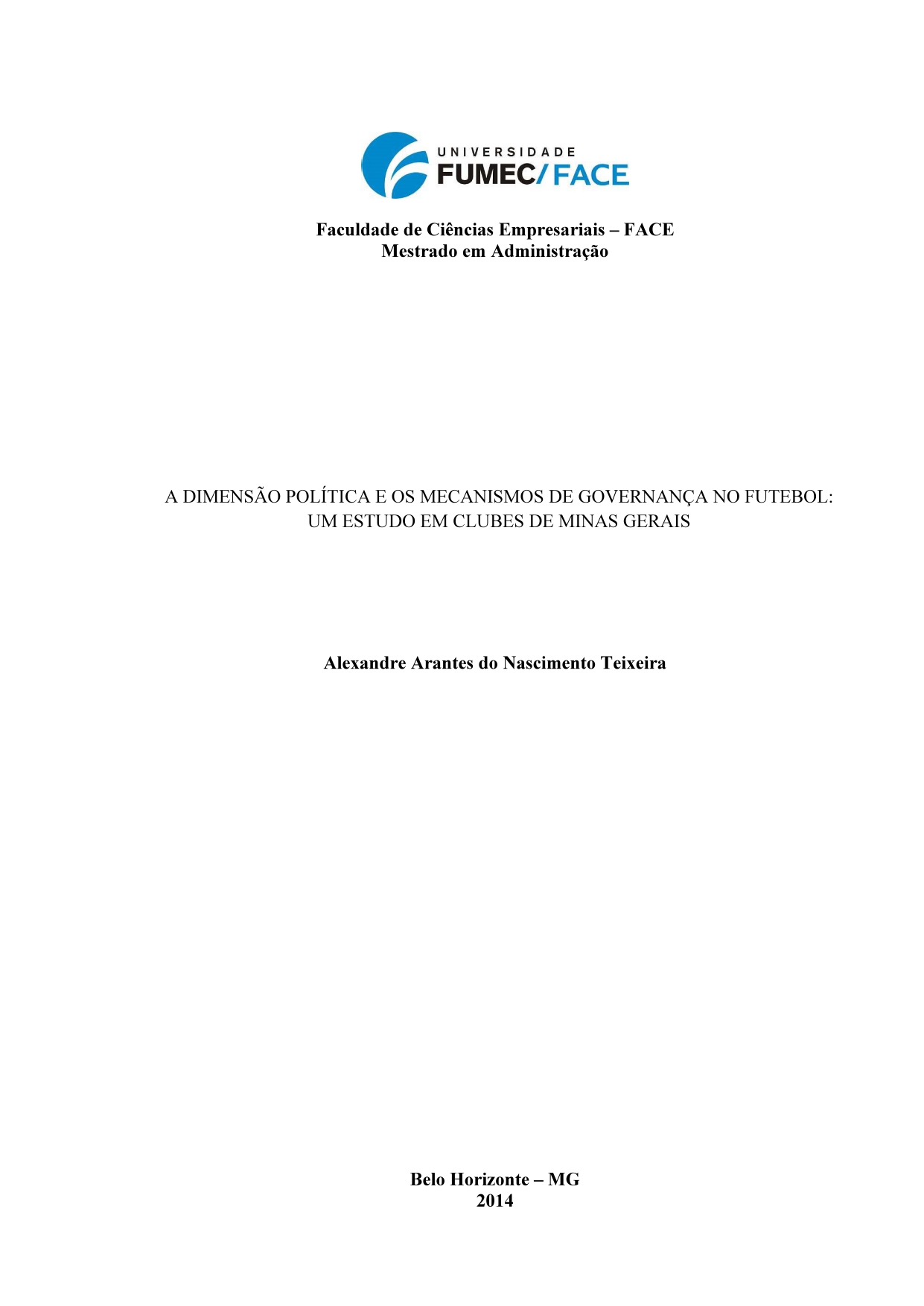A dimensão política e os mecanismos de governança no futebol: um estudo em clubes de Minas Gerais

Visualizar/
Data
2014Autor
Teixeira, Alexandre Arantes do Nascimento
xmlui.mirage2.itemSummaryView.MetaData
Mostrar registro completoResumo
Tendo em vista o fato do futebol representar, na atualidade, um grande negócio cuja lógica de
resultados opõem-se à atual realidade administrativa e financeira dos clubes brasileiros,
consideramos a importância do uso da Governança Corporativa (GC) nas empresas. Partindo-se
dos pressupostos que fundamentam a teoria de Bourdieu (1998), objetivou-se, com este estudo,
analisar a prática da GC nos três principais clubes de futebol de Minas Gerais– América Futebol
Clube, Clube Atlético Mineiro e Cruzeiro Esporte Clube. A metodologia utilizada é qualitativa
apoiada em entrevista semiestruturada e análise documental. Concluiu-se que a influência da
política na gestão dos referidos clubes, decorrente do uso indevido do poder para a satisfação de
interesses particulares, característica inerente ao sistema presidencialista, manifesta-se de forma
negativa, por distanciar e, até mesmo, contrariar às normas da GC. Verificou-se também a
predominância da influência do capital social e simbólico sobre os mecanismos de gestão, seguido,
em ordem gradual de impacto nas ações administrativas, pelo capital financeiro e cultural. A
consequência desfavorável para os clubes, do ponto de vista empresarial, é a preservação do
continuísmo pela centralização do poder nas mãos de um grupo dominante, que aponta para
conflito de interesses entre os dirigentes, contrariando as necessidades dos clubes apresentadas
pelos gestores e os interesses dos stakeholders. Ficou evidenciado que as tomadas de decisão pelos
dirigentes contrariam as recomendações do corpo gestor, quando constatado que o saldo financeiro
dos clubes é negativo, o que revela gestões comprometedoras dos resultados tanto pela falta de
independência dos conselhos e de transparência das ações como, consequentemente, pela ausência
de uma fiscalização independente e, portanto, de caráter idôneo. In view of the fact that football represents in actuality, a great deal of logic whose results
are opposed to the current administrative and financial reality of Brazilian clubs, consider
the importance of using the Corporate Governance (CG) in these companies. Starting from
the assumptions that underlie the theory of Bourdieu (1998), is aimed with this study,
analyze the practice of CG in three major football clubs in Minas Gerais-America Football
Club, Clube Atlético Mineiro and Cruzeiro Esporte Clube. The methodology is supported
by qualitative semi-structured interviews and documental analysis. It was concluded that
the influence of politics in the management of these clubs, arising from the misuse of
power to satisfy private interests, feature inherent to presidential system, manifests itself
negatively, by distancing and even contrary to the rules the CG. There was also the
predominance of the influence of social and symbolic capital on management mechanisms,
followed in order of gradual impact on administrative actions, the financial and cultural
capital. The unfavorable for clubs, the business point of view, the result is the preservation
of continuity by the centralization of power in the hands of a dominant group, pointing to a
conflict of interests between the leaders, against the needs of clubs made by managers and
interests of stakholders. It became apparent that decision making by leaders oppose the
recommendations of the officer corps, found that when the financial balance of the clubs is
negative, which shows the results compromising efforts by both the lack of independence
of advice and transparency of actions and hence the lack of independent oversight and
therefore suitable character.
